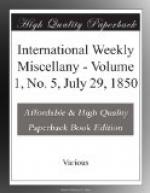He was once elected to the House of Representatives from his adopted State, and was excluded from his seat by the casting vote of James K. Polk, at that time Speaker of the House. The facts in regard to the affair, according to the Tribune, are substantially as follows: In 1837, the President, Mr. Van Buren, called an Extra Session of Congress to assemble in September of that year. The laws of Mississippi required that the election for Congressmen for that State for the twenty-fifth Congress should be held in November, and in order that the State should be represented in the Extra Session, the Governor ordered an election to be held in July for the choice of two Congressmen “to fill the vacancy until superseded by the members to be elected at the next regular election, on the first Monday, and the day following, in November next.” The election was held under the authority of the Governor’s proclamation, and the Democratic candidates, Claiborne and Gholson, were elected by default. They took their seats in the House, in which there was a decided Democratic majority, and immediately applied themselves to the task of inducing the House to declare that they had been duly elected not only for the Extra Session, but for the full term of two fears following. Of course they accomplished their object. The November Election arrived and the Whigs nominated Prentiss and Word. The Democrats brought out Claiborne and Gholson again, and the result was that the Whig candidates were chosen by a triumphant majority. They received their certificates of election from the proper authority and presented themselves at the regular session of Congress in December, and found their seats occupied by the brace of Democrats whom the people of Mississippi had elected to stay at home, and after a most severe and memorable contest, the new members presented themselves for admission at the bar of the House, which decided readily that Claiborne and Gholson were not entitled to their places, but instead of admitting Prentiss and Word, by Mr. Polk’s casting vote declared the seats vacant, and referred the whole subject back to the people. During the discussion of the question Mr. Prentiss made a speech which will be remembered and admired as long as genius and true manly eloquence are appreciated. Another election was held in the following month of March, and Prentiss and Word were again returned, and this time they were admitted to their seats. The remaining session of the twenty-fifth Congress, Prentiss served with distinguished ability. We believe this closed his career as a statesman. He recently removed to New Orleans, where he continued the practice of the law, standing always at the head of his profession.
* * * * *




